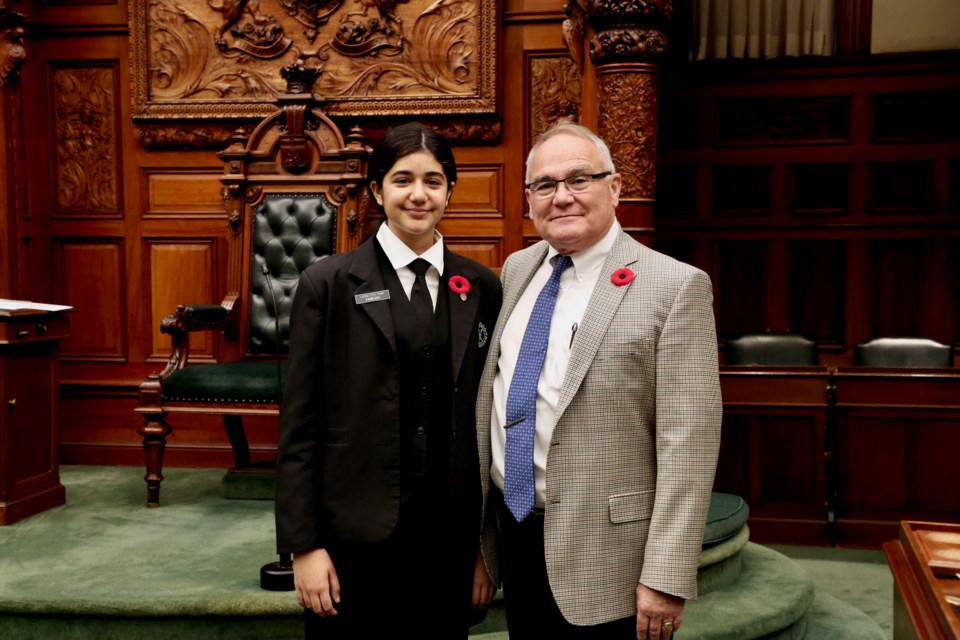The world of politics was not something Vanessa Bal was all that familiar with.
But after serving as a page at the Legislative Assembly of Ontario in Toronto, this all changed for the Grade 8 student from Cambridge.
Each year approximately 150 young students from across the province are selected to participate in the Page Program.
The program offers an opportunity for students to experience the ‘day to day’ at Queen’s Park, to witness how decisions are made, and how a bill becomes law.
Legislative pages meet key parliamentary and political figures and learn first-hand about Ontario’s Parliament and the legislative process.
The program is designed for outgoing, high-achieving, community-involved students who have demonstrated responsibility and leadership.
Bal served a two-week term from Oct. 24 to Nov. 4.
“My brother was a page when he was in Grade 8. He’s in high school now and in Grade 11,” Bal said.
“He had heard about it from a friend who had a very positive experience. So, I thought why not give it a shot. He had a great time. I remember visiting for a day and it seemed interesting. So, I put my application in.”
There are multiple page cohorts throughout the Parliamentary year with about 20 Pages at a time per cohort.
In my term, there were 19 others serving with me. They were from all over Ontario, and in different ridings,” Bal said
“I made new friends and still keep in touch with many of them online.”
At Queen’s Park, pages fill many different roles including working in the Chamber during sittings, as well as meeting with and delivering documents to MPPs.
“The main job of a page is to be an assistant to the members. This includes passing notes, grabbing water, and delivering messages throughout the building,” Bal said
“We would also do special requests and grab things for members if they needed something. I think the whole point of the program is to give us a glimpse into the political world.”
When not serving in the chamber, pages receive lessons.
“We also received legislative process classes where we were able to take what we saw in the chamber and break it down. We learned more about politics than we would in school," Bal said.
Bal, a student at St. Augustine Catholic School in Cambridge, said that she received much support from her school community when applying to the Page Program.
“My school was very onboard and supportive. In order to apply, you need recommendation letters. You need your teacher and principal to sign off on it and say that it’s ok for the student to miss this amount of school. They help with the application process,” Bal said.
“When everyone at school found out that I got in, they were all very excited.”
During her term, Bal kept a journal, documenting her experiences at Queens Park.
“I made an entry every day. I showed it to my teacher and presented it to my class, just in case any of them were considering applying for the spring session or just if they were curious,” Bal said.
"I definitely learned a lot more about politics and how decisions are made. I think that was the main thing. I didn’t actually know a lot about politics going into it. I went into it not knowing a lot and wanting to learn. And I did learn a lot about the different processes. It really opened my eyes to politics as a new career path.”
Bal says before her experience serving as a page, she would not have considered a career in politics.
“Now coming out of it, it was such a positive experience, and it was really cool to see decisions being made firsthand. So, this is definitely something that I’m now considering as a career,” Bal said.
Bal says she also says she is grateful for the support received from her parents and her brother, after following in his footsteps as a page.
“My parents loved it. They got to come and visit me for a day with my brother as well. They were very excited,” Bal said.
“We came at a very interesting time with the CUPE strikes and I was able to see something that affects my daily life because I am in a Catholic school. My parents were proud. I think they also knew more going into my term because my brother served.”
Pages have been an important part of Ontario’s Parliament since Confederation. Early pages were 10 to 14-year-old boys who carried messages, ran errands, and fetched glasses of water for Members of Provincial Parliament.
The role of the Page remained the same throughout the first half of the twentieth century. In 1952, a tutor was hired to work with the Pages a few days a week. Today, eligibility requirements have changed. Pages are students in grades 7 or 8, with a minimum academic average of 80 per cent.
“I encourage other students to take part in this because it really opened my eyes to a new world,” Bal said.
“And its just a great learning experience. I’ve made many different friendships, and if you are interested in politics, it really is great to see those decisions made firsthand. There’s something for everybody. Why not apply, and put yourself out there. It’s great to put your name forward, because you never know.”
Applications for the spring 2023 term are now open and are being accepted until November 30th, 2022.
For more information about the Page Program visit here.


.png;w=120;h=80;mode=crop)
